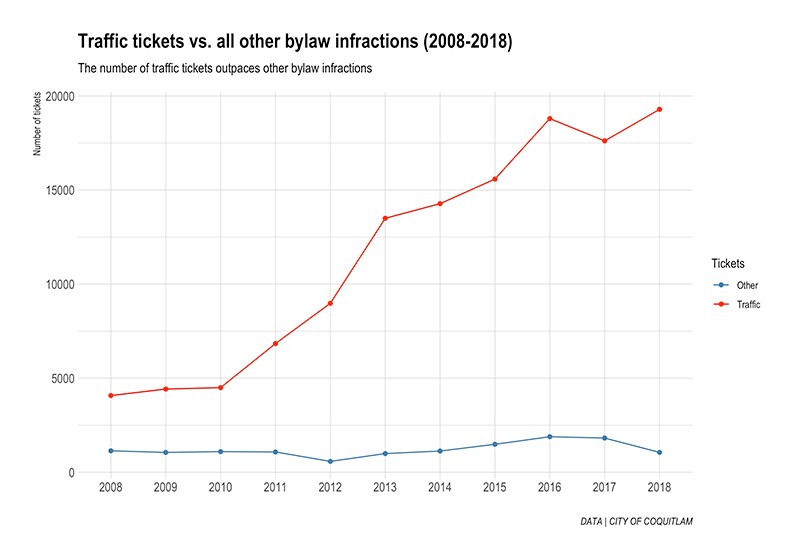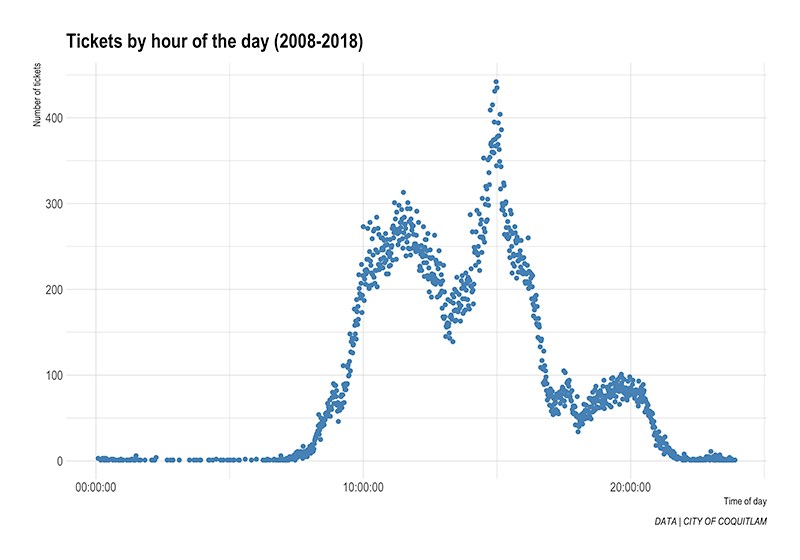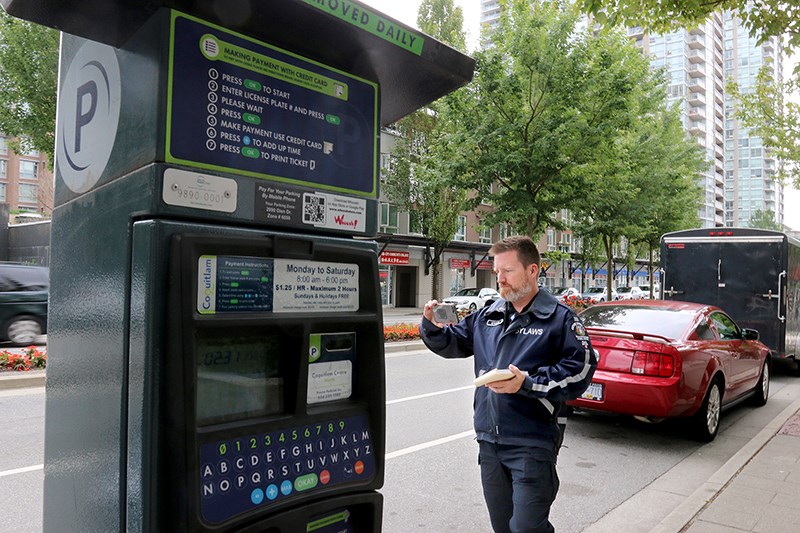Nobody likes getting a parking ticket. But these days, bylaw officers in the Tri-Cities are writing more citations than ever before.
According to data analyzed by The Tri-City News, Coquitlam issued 19,290 parking tickets last year — a 373% increase since 2008 — while Port Coquitlam has seen an even bigger jump of 526% in the last 10 years and Port Moody a relatively modest hike of 35%.
And parking is big money for municipal budgets.
In 2018, for example, motorists pumped approximately $450,000 into Coquitlam’s parking meters and paid $427,000 in fines.
But Glen Spence, an enforcement supervisor with the city of Coquitlam, insists bylaw officers are not out to ruin anybody’s day or pad city coffers. He said the goal of parking regulations is to improve safety and ensure vehicle turnover in the city’s busy commercial areas. 
Spence added that it is rare he or his colleagues are approached by an irate motorist they’ve just written up.
“Nobody wants that,” he said. “We try and explain the need for the enforcement. A lot of people do understand it.”
Today, there is more traffic and more demand for stalls, factors that have led to a greater number of streets with parking regulations, he said. Technology has also changed, with automated licence plate recognition systems used to efficiently identify vehicles that have overstayed their time limits.
“The city has grown in the last 20 years,” Spence said, noting the addition of SkyTrain and many highrise developments. “That has increased traffic density… and there is a need to have those regulations to keep everything moving.”
TIMING
Coquitlam’s enforcement division is cagey when it comes to discussing when and where it deploys resources but analysis of the bylaw data gives some hints as to when you’re more likely to get a ticket if parked illegally.
For example, a graph outlining the distribution of tickets by time of day shows a significant drop in citations at around 12 p.m. — lunch time — before picking up again in the afternoon.

While the city can schedule officers around the clock, Andrea MacDonald, Coquitlam’s manager of bylaws, licensing and animal services, concedes the majority of the approximately dozen enforcement officials work fairly typical hours and tend to take their breaks in the middle of the day.
“You will notice a slight reduction between 12 and 2 p.m.,” she said.
The data also shows that more tickets are issued on Tuesdays, Wednesdays and Thursdays, when MacDonald said there is typically some scheduling crossover, leading to more staff on duty.
As well, January is the busiest month, with an average of 1,102 tickets issued, while August is the quietest, with an average of 848 tickets handed out by officers.
PARKING STRATEGIES
Different cities have different strategies for parking enforcement.
In Port Moody, for example, bylaw data available through the city’s website shows Saturdays and Sundays are the biggest days for parking tickets, and July and August are the busiest months.
The uptick in summer citations coincides with the addition of two seasonal bylaw officers and increased enforcement of parking regulations at the Rocky Point boat launch.
Special events are also busy times for Port Moody enforcement officials. For example, RibFest sees some of the biggest numbers when it comes to traffic tickets — an average of 46.6 per day compared to an average of 13 for a typical Saturday or Sunday.
In fact, some of the highest numbers of citations written in a single day over the last decade occurred during the popular barbecue event, with 73 issued July 23, 2016, and another 73 issued on the same date in 2017.
Patrik Kolby, the city’s senior bylaw enforcement officer, told The Tri-City News last month that the jump in tickets during RibFest is related to the increased number of patrons visiting the park.
“Parking at Rocky Point is extremely limited when there are special events happening,” he said. “We encourage members of the public to leave their car at home and walk, bike or take public transit instead.”
Port Coquitlam is another community that has seen a significant rise in the number of parking tickets, particularly in the last five years.
Between 2008 and 2013, the number of citations hovered at around 500 per year. In 2014, however, the numbers started to rise dramatically and, last year, PoCo bylaw officers issued 2,338 tickets.
Paula Jones, PoCo’s manager of bylaw services, said the increase is due to stepped-up enforcement in school zones and in the city’s downtown core.
NO QUOTAS
One thing it’s not due to is quotas.
Often, motorists accuse bylaw officials of trying to “make their quota,” something Coquitlam’s Spence denies exists.
The goal is to educate the public and keep vehicles from cluttering streets for long periods of time, he said, not to punish motorists with tickets.
Spence also notes that most enforcement officers are reasonable and will acknowledge if they issued a ticket in error.
“There is an opportunity for them to void a ticket,” he said. “That happens a fair amount when things are reasonable.”
After all, even bylaw officials occasionally get tripped up by the rules.
Spence said he recently received a ticket in Coquitlam after not returning to his vehicle before his time expired.
“By the time I got back, I received a parking ticket, as I should have,” he said. “And I paid it.”



